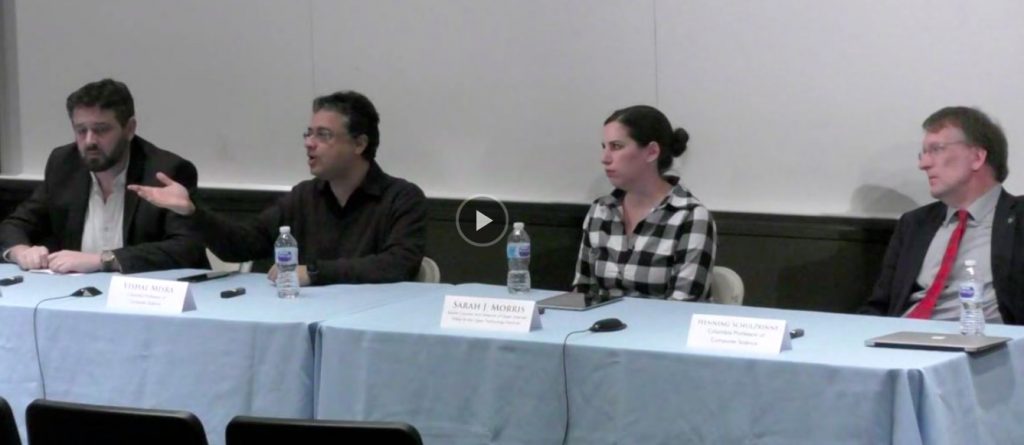Panel on net neutrality discussed upcoming repeal of net neutrality rules
![]()
 Last Friday, with less than a week remaining before the FCC’s expected repeal of the Open Internet Rules, a panel of four experts convened before an audience in Davis Auditorium to discuss what such a repeal is likely to mean for the Internet. Though all four spoke from different perspectives—three were technology experts and one an Internet consumer advocate and lawyer—all expressed concerns about the repeal. (Though proponents of the repeal had been invited, none were able to attend.)
Last Friday, with less than a week remaining before the FCC’s expected repeal of the Open Internet Rules, a panel of four experts convened before an audience in Davis Auditorium to discuss what such a repeal is likely to mean for the Internet. Though all four spoke from different perspectives—three were technology experts and one an Internet consumer advocate and lawyer—all expressed concerns about the repeal. (Though proponents of the repeal had been invited, none were able to attend.)
The panel was moderated by Ethan Katz-Bassett, a professor of electrical engineering at Columbia, who is an expert on Internet services and content delivery, and by Brittney Gallagher, Digital Culture Correspondent for Digital Village, the oldest running radio program in Los Angeles that covers the Internet.
The discussion started with a rundown of the three bright lines that cannot be crossed under current rules—no throttling, no blocking, no paid prioritization. It is these rules (as well as other general-conduct rules) that, according to Sarah Morris ensure that Comcast doesn’t prioritize its streaming platform over Netflix or that a company can’t pay AT&T to favor its traffic over the traffic of a competitor.
While much attention has been focused on how the order will remove protections that prevent internet service providers (ISPs) like Comcast and Verizon from restricting or prioritizing traffic, Henning Schulzrinne, whose second term as CTO at the FCC just ended in October, pointed out the order also removes the FCC’s power to regulate Internet service, handing over this responsibility to the FTC. Given that the FTC has no authority to issue blanket rules to ban blocking or prevent other discriminatory practices, the US will effectively have no Internet regulation at all, a situation Schulzrinne calls unprecedented.
Another topic discussed was the lack of competition among the last-mile providers, that is, the ISPs that control the cables that run from the Internet’s main transit cables to smaller, neighborhood-scale cables that go to each individual house. Expensive as it is to lay these cables, no one was advocating for replicating last-mile cables, but under current conditions, the company that builds the last-mile cable controls access to customers.
Without competition and soon without any regulation, there is nothing to prevent AT&T, Verizon, or Comcast from monetizing their access to customers. In fact, in a market economy, there is every incentive to exploit one’s stranglehold on consumer eyeballs to extract access fees from content providers. While large rich companies like Amazon, Apple, Facebook, Microsoft, and Alphabet (Google)—the “frightful five”—can afford to pay for access to customers, many other companies cannot. It’s especially difficult for fledging startups and for not-for-profit sites and services.
For Vishal Misra, the solution is to switch from the “infrastructure-based competition” the US has currently to a model where service is based on competition between ISPs, with all ISPs having access to a common last mile everywhere and competing for customers by providing better services. It is a solution, however, that requires telecommunications oversight.
The potential downsides for innovation and new services of the FCC’s expected action was another of the topics covered. While FCC chairman Ajit Pai has argued that repeal of net neutrality is necessary for investments and to make the internet better through faster internet speeds, Peter Boothe said his analysis of M-Lab measurements over time suggests that Internet performance in the US improved at least as fast—and probably faster—since February 2015 (when the current regulations went into effect) than it was improving before the regulations.
The panel discussion in its entirety can be seen here.

Posted 12/11/2017
– Linda Crane

